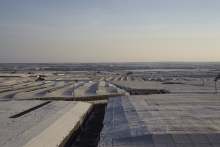Pesticides used in agriculture can often leave detectable traces of chemicals in, or on, our food known as ‘residues’. The residues detected on a food item will depend on which pesticides have been used and how persistent they are, in other words, how long they take to decompose.
PAN’s annual Dirty Dozen list of the ‘dirtiest’ fruit and vegetables reveals the produce most likely to contain cocktails of multiple pesticides.
The Dirty Dozen is based on PAN UK analysis of the UK government’s pesticide residue testing programme and the latest release in March 2024 reveals the fruit and vegetables most likely to contain more than one pesticide in 2022 (the most recent year for which data is available).
For example, 100% of grapefruits tested had residues of two or more pesticides, as did 84% of grapes, 83% of strawberries, and 81% of cherries.
In addition, there has been a dramatic increase in the proportion of wine that contains multiple pesticide residues –
from 14% in 2016 (the last time that wine was tested) to 50% in 2022. Data shows residues of 19 different pesticides (up from 16 in 2016) in the 72 wine samples tested, including nine chemicals with links to cancer.
The overuse of pesticides in wine production not only poses a threat to the health of British consumers but also to those living and working in wine-producing areas.
What can consumers do to avoid pesticides on food products?
One option is to buy organic wine and organic fruit and veg, concentrating first on the dirty dozen.
Washing or peeling fruit and veg may remove some pesticides but many of the pesticides used are systemic meaning the residues will be within the body of the produce.






